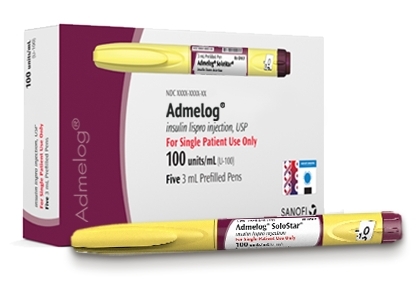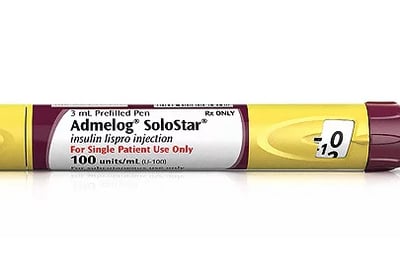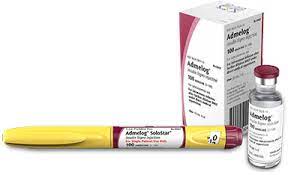Admelog: The First Biosimilar Rapid-Acting Insulin
By April Hopcroft
 Admelog, an alternative to the common mealtime insulin Humalog, is available in disposable prefilled pens and vials and can be used in insulin pumps.
Admelog, an alternative to the common mealtime insulin Humalog, is available in disposable prefilled pens and vials and can be used in insulin pumps.
In 2017, Sanofi’s Admelog became the first biosimilar fast-acting insulin in the US. Admelog (insulin lispro injection) is used to lower blood sugar levels for people with type 1 diabetes ages three and older and adults with type 2 diabetes.
As a biosimilar to the mealtime insulin Humalog (insulin lispro), Admelog works the same way as Humalog to provide glucose control – specifically, by reducing blood sugar spikes. Admelog is available in disposable prefilled pens and vials and can be used in insulin pumps. It is also approved in Europe under the name “Insulin lispro Sanofi.”
What is a biosimilar insulin?
Biosimilars have very similar structure and function to existing biologics (medications made in a natural, living system). This is sometimes also called a “follow on” product. Biosimilars undergo testing, are reviewed by the FDA, and are just as safe and effective as their brand name products.
As a biosimilar, Admelog has a very similar structure to Humalog and therefore acts very similar to Humalog. While the two drugs are not 100% identical, the differences are so small that they are not considered meaningful.
Other examples of biosimilars in the space include three biosimilar basal insulins: Basaglar, Rezvoglar, and Semglee – all modeled on the popular long-acting insulin Lantus (insulin glargine).
What’s the difference between generics and biosimilars?
A generic is an identical copy of a brand name drug, while a biosimilar is not an exact copy. Additionally, generics are made from chemicals, while biosimilars are made from natural sources.
Generics and biosimilars are just as safe and effective as their brand name drugs, and both tend to cost less than the brand name versions.
What forms is Admelog available in?

Admelog is available in two forms. It comes in a disposable 3 ml prefilled pen – just like many other insulins, such as Lantus, Toujeo, and Semglee. Admelog is also available in a 100 unit/ml (U-100) 10 ml vial that is approved for use in an insulin pump.
How much does Admelog cost?
According to GoodRx, one 10 mL vial of Admelog costs about $115, while one carton containing five pens costs about $210.
What savings programs are available for Admelog?
Through Sanofi’s insulin savings program, you may be able to access Admelog at a lower cost. Eligible patients with commercial insurance pay at most $35 for a 30-day supply, and eligible patients with no commercial insurance pay $35 for a 30-day supply for one or multiple Sanofi insulins.
Those taking insulin can register for savings here and reach out to Sanofi Patient Connection with further pricing questions.
What are the possible side effects of Admelog?
Since Admelog works to lower blood glucose levels, low blood sugar (hypoglycemia) is the most common adverse reaction. Using a continuous glucose monitor (CGM) can help you monitor blood glucose while using insulin therapy. Other side effects of Admelog include:
-
Weight gain
-
Allergic reactions
-
Injection site reactions, such as pain, redness, and swelling
-
Rash or itchiness
-
Swelling
-
Common cold
-
Upper respiratory tract infection
Contact your healthcare provider immediately if you experience a severe allergic reaction or other symptoms that bother you.
Admelog: The bottom line
 The FDA tentatively approved Admelog in September 2017 based on studies showing that it was just as effective and safe as Humalog, but the regulatory agency waited to announce formal approval until patent disputes between Sanofi and Lilly, the manufacturer of Humalog, were resolved.
The FDA tentatively approved Admelog in September 2017 based on studies showing that it was just as effective and safe as Humalog, but the regulatory agency waited to announce formal approval until patent disputes between Sanofi and Lilly, the manufacturer of Humalog, were resolved.
The approval of biosimilar insulins is especially important given the finding that 16.5% of insulin users skipped insulin doses, took less insulin than they needed, or delayed buying insulin, all due to cost.
“This [commitment] is particularly important for drugs like insulin that are taken by millions of Americans every day for a patient’s lifetime to manage a chronic disease,” then-FDA Commissioner Scott Gottlieb noted at the time.
Learn more about accessing insulin:
Photo credit: Sanofi







